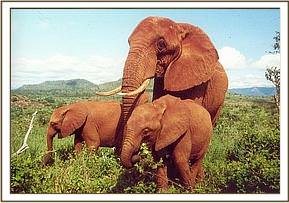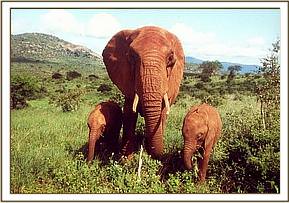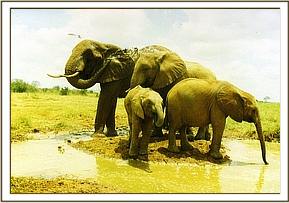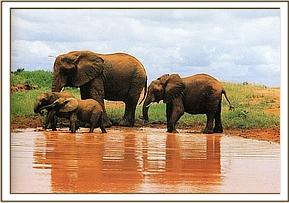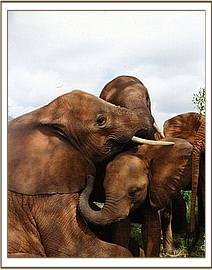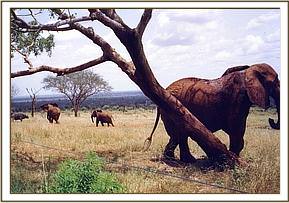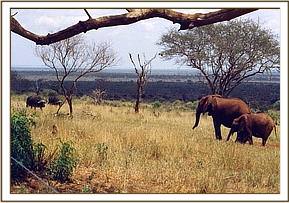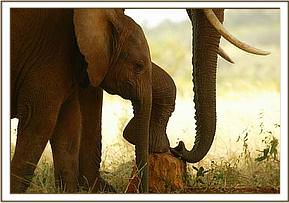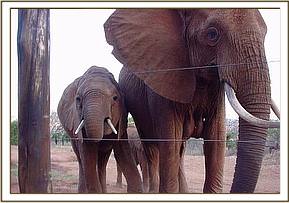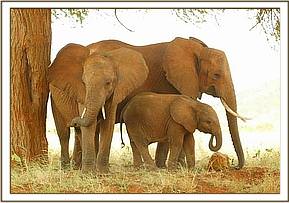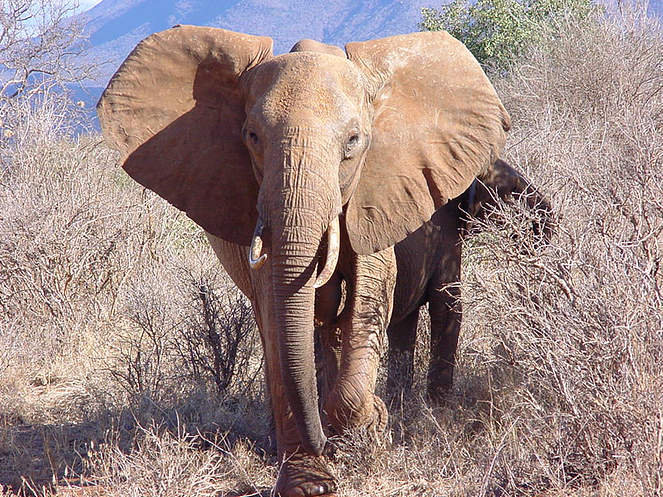





Has fully embraced her wild life in Tsavo East National Park
Current age
39 years old
Gender
Female
Rescued date
15 October 1988
Rescue location
Tsavo Ecosystem
Date of birth (estimate)
1 October 1986
Reason orphaned
Poaching
Age at rescue
2 years old (approx)
Current location
Living Wild
She was spotted by Lissa Ruben, who orchestrated her rescue – hence this elephant’s name, “Lissa”. At the time she was pathetically emaciated, and had a back leg that had obviously been broken in infancy, and had healed mis-shapen, all too obvious in view of the gaunt appearance of this calf, who had practically no flesh on her bones. Because of the age of the calf, she was handed over directly into the custody of the then elephant Matriarch, “Eleanor”, who nurtured and took into her care all the orphans that were brought in aged two and older during those tragic years.
Lissa immediately bonded with Eleanor, and was with her until Eleanor became pregnant in the early nineties, handed over her adopted family to a wild friend, the cow given the name “Catherine”, and left to have her baby far from the possibility of human intervention, obviously fearful that her human family might take it from her. (Female elephants who do not have an intact blood family of their own, are very prone to trying to abduct young calves in order to build one, and Eleanor herself had been guilty of this with the first-born of another elephant named “Mary”, who was within her unit. Since Eleanor was not raised through the Nairobi Nursery, unlike others that were, she did not understand how Daphne came to have so many elephant babies, and thinking in elephant terms, feared that they, too, must have been abducted!)
The next time Lissa returned, the calf was trailing a wire snare from one back leg. Fortunately, the noose was not tight, but it needed to be removed. Being wild-born, the Keepers could not catch up with the calf, but Lissa obviously understood what needed to be done, for she walked calmly into the Stockades, and continued quietly feeding, paying no attention to the terrified bellows of her baby as the Keepers pursued it around the Stockades in an attempt to capture it. Eventually, the other orphans were brought in. Immediately, they surrounded the calf, who was pinioned in their midst, which enabled the Keepers to crawl beneath the surrounding elephant bodies and remove the snare from Lara’s leg. Lissa, was then reunited with her baby, and all was well once more, as they walked calmly off together back from whence they had come.
On the 22nd November 2002, Lissa returned to the base of Mzinga Hill in the vicinity of the Stockades, along with a large herd of about 50 wild elephants, all in a great state of excitement. Sensing that something unusual was about to happen, some of the Keepers climbed onto a huge rock, and from this vantage point, they could see Lissa in the midst of the wild group, obviously in labour, lying down and getting up at intervals. After a while, the baby was born as she was in a squatting position, and amazingly, a huge bull barged through the attendant cows, and immediately mated poor Lissa. (Apparently, the hormones released when a birth is imminent, and during the birthing process, closely resemble those of a cow in estrous. In a natural elephant family, the cow about to give birth would leave with a few close adult female relatives to seek a secluded spot, protected by her adult female family).
After Lissa’s second baby was born, the excitement within the herd was intense, with trumpeting, rumbling, and elephants milling around the mother and her baby, trying to encourage the baby to its feet. When things quietened down again, and the baby was moving on wobbly legs, Lissa and Mpenzi took the new calf under some shade, and the other elephants began to disperse. The Keepers were able to see that her second baby was also a female and we have named her “Lali”.
Lissa has had five calves over the years and is now a grandmother too after her eldest daughter Lara gave birth to a little girl. Their stories can be read in the updates section of Lissa's profile.
She was spotted by Lissa Ruben, who orchestrated her rescue – hence this elephant’s name, “Lissa”. At the time she was pathetically emaciated, and had a back leg that had obviously been broken in infancy, and had healed mis-shapen, all too obvious in view of the gaunt appearance of this calf, who had practically no flesh on her bones. Because of the age of the calf, she was handed over directly into the custody of the then elephant Matriarch, “Eleanor”, who nurtured and took into her care all the orphans that were brought in aged two and older during those tragic years.

View diary updates from across all our orphan units as written by the Keepers

Following in the wake of Mbegu, Ndotto and Lasayen who headed down on Monday 21st May, best friends Ngilai, Godoma and Murit journeyed in the early hours of Wednesday 23rd May, to ensure a traffic-free journey in cool temperatures, to Voi in Tsavo East National Park.
Lara is the first wild born calf to Lissa, an orphan now living back in the wild. Her main nanny was Mpenzi, another orphan also living back in the wild. Lara is to the right of this photograph, on her immediate right is Lali and then Lugard.
Lali was born just outside the Voi Stockades and is the second wild born baby of Lissa, an orphan living back in the wild.
Lugard is the third wild born calf to Lissa, an orphan now living back in the wild. Lugard is in the middle in this photograph, his older sister Lali to his right. Read more
Lazima is the fourth wild born calf to Lissa, whose name means "it has to be" in Swahili. Lazima is the baby suckling in this photograph. Read more
First introduced to the Voi Keepers by his mum, Lissa, when he was four-months-old, Leo seemed totally familiar at the Voi Reintegration Unit, which is probably testament to his mother`s calm presence around the Keepers having had 5 wild born babies since her rehabilitation back into the wild. Read more
By adopting, you play a vital role in the life of an orphaned elephant, rhino, or giraffe — helping us provide the round-the-clock, loving attention each one needs and deserves over many years, so they can ultimately reclaim their place in the wild.
Your adoption supports the 100+ orphans in our care at any given time, covering the cost of milk and food supplies, Keepers' salaries, veterinary treatment, and other essentials.

Celebrate your adoption with a personalised certificate, ready for you or your lucky gift recipient to print and display!

Each month, we send a detailed update about our Orphans’ Project direct to your email inbox, featuring photos, stories, and special highlights.

From the latest Keepers’ Diaries to a downloadable image gallery and more, adopters have exclusive access to our content library.
